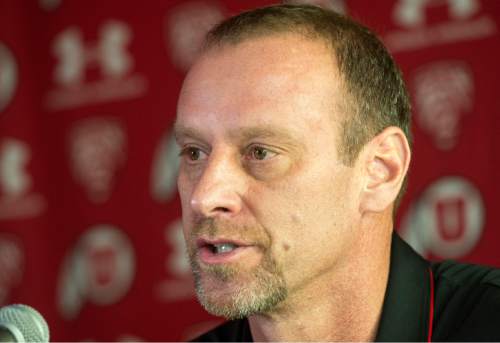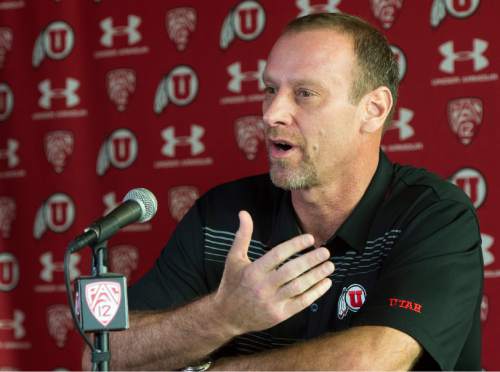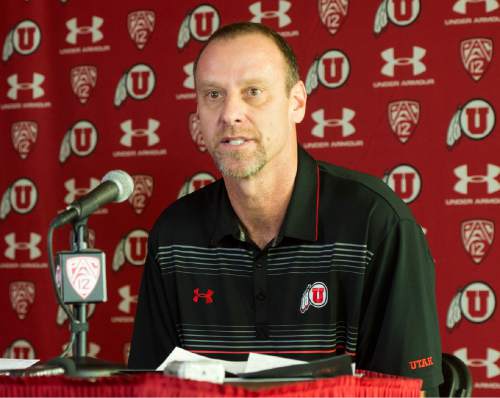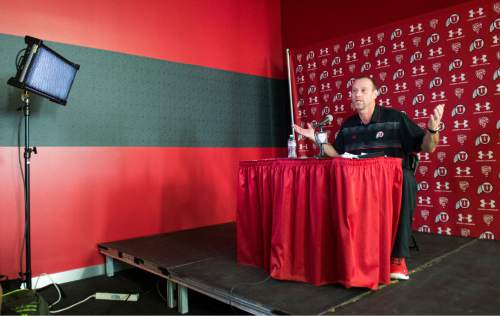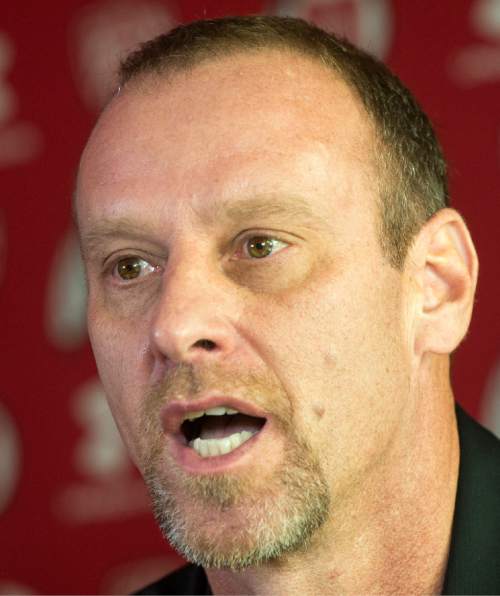This is an archived article that was published on sltrib.com in 2016, and information in the article may be outdated. It is provided only for personal research purposes and may not be reprinted.
If the University of Utah wins the 2016-17 NCAA championship, as happened the last time the school's basketball schedule failed to include BYU, the Utes' strategy of canceling next season's meeting will be rewarded.
The 1943-44 instance came during World War II, when BYU didn't field a team. Skipping next season's game in Provo is Utah's doing, with coach Larry Krystkowiak blaming BYU's on-court behavior for his decision.
That's an overreaction. I'll maintain my stance, believing that alternatives such as a mutual sportsmanship campaign exist — and remain necessary. It is apparent that Krystkowiak's bosses will have to overrule him for the basketball rivalry to resume sometime after next season, and I hope they do. His explanation is certainly satisfactory, but not fully satisfying.
Krystkowiak's demeanor at his weekly news conference Monday impressed me, though. Glancing at some notes and fielding several questions, he spoke almost nervously — not condescendingly, not defiantly. He even resisted a school publicist's suggestions to change the subject to Thursday's game vs. Oregon.
I came away convinced that player safety genuinely is Krystkowiak's only motivation, in a rivalry environment where he cited a need to "actually protect myself from myself" in terms of his own actions. So it all comes down to one question: Is that a valid reason?
Tricky subject, right? Dismissing the safety argument is like campaigning against literacy or endorsing homelessness. What if somebody really does get hurt, the next time the teams meet?
As Krystkowiak said to another questioner, "Would you agree with me that something's broken?" Yes, although I disagree with his belief that bringing together people from the two schools to fix it between now and December is "not realistic."
In any case, Krystkowiak made clear that he expected more than the publicly issued apology from BYU guard Nick Emery, who punched Utah's Brandon Taylor in the late stages of the Utes' victory last month, and that Emery's further taunting of Taylor showed "a lack of remorse."
Krystkowiak also acknowledged that he "almost got carried away" in the aftermath of the punch. A self-described "hockey thug" in his NBA days, Krystkowiak said, "I don't want my players to see me looking foolish."
Soon after that Dec. 2 incident in a packed Huntsman Center, Krystkowiak told BYU coach Dave Rose of his plans to cancel the December 2016 game. BYU then made the cancellation announcement out of the blue last week, forcing Utah to explain itself. Over the weekend, Krystkowiak met with school president David W. Pershing and athletic director Chris Hill, who endorsed his stance.
Hill's job is to "support my coaches, when it's right," he said.
Like any public school, Utah needs the state government's financial support. Via Twitter, Gov. Gary R. Herbert insisted, "Play the game."
That's why Pershing's statement on the subject promised the Utes would schedule two in-state schools in basketball every year, with BYU listed among the five Division I possibilities. Krystkowiak and Hill even said the Utes are willing to play on the road, in varying arrangements.
That represents some progress, in a world where Utah is accused of viewing itself above other in-state schools. So does Pershing's intention to form a "working group" to promote sportsmanship in the rivalry.
The cancellation will cost Utah an $80,000 buyout, ESPN reported. That's merely equivalent to about five years of Krystkowiak's "vacation allowance" in a contract approaching $3 million annually. Yet it is meaningful that, according to Hill, Krystkowiak volunteered to pay the penalty.
That shows how much Krystkowiak believes he's doing the right thing for his program. And in this case, after his five years on the job, I'll conclude that he has earned the right to be wrong.
Twitter: @tribkurt


